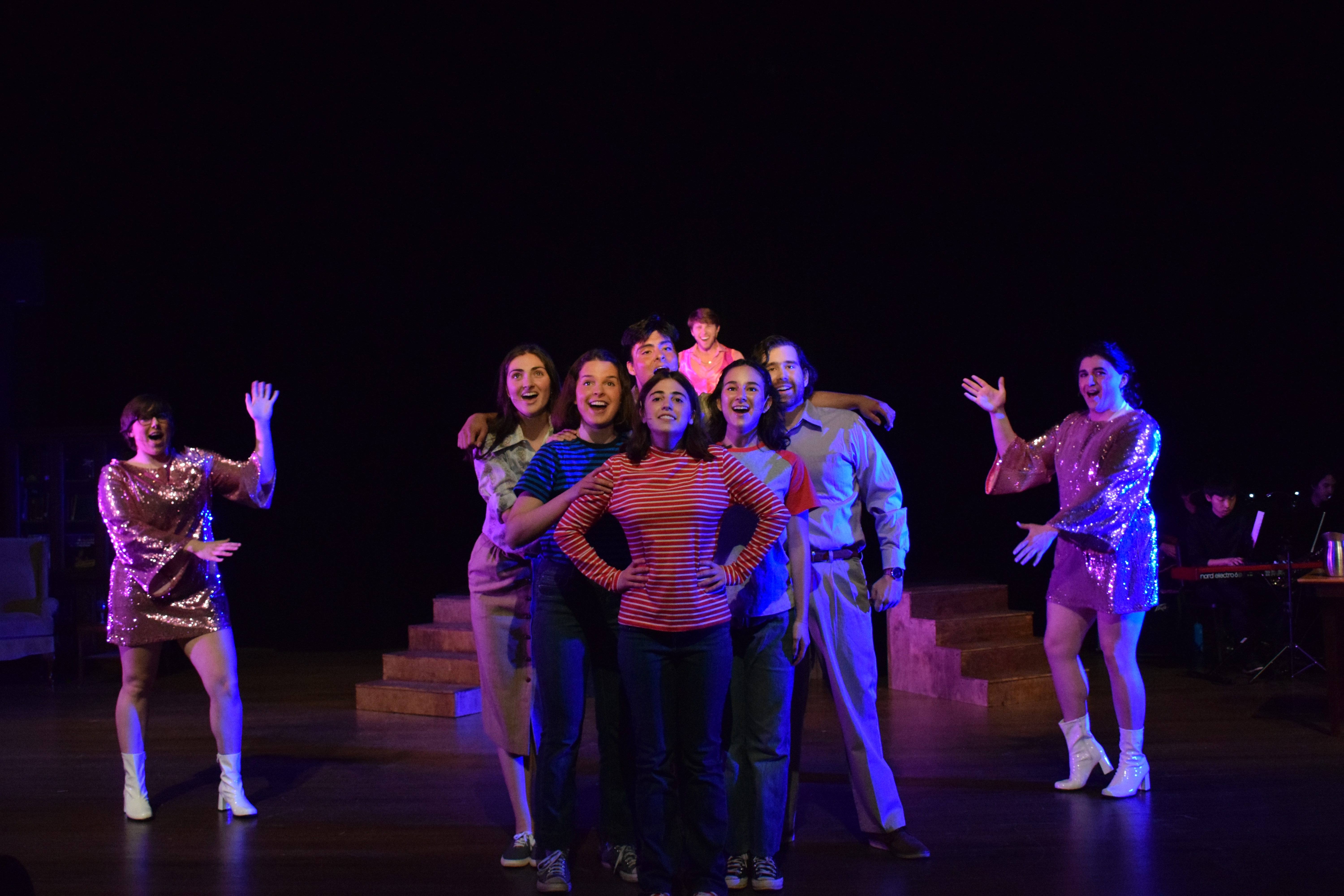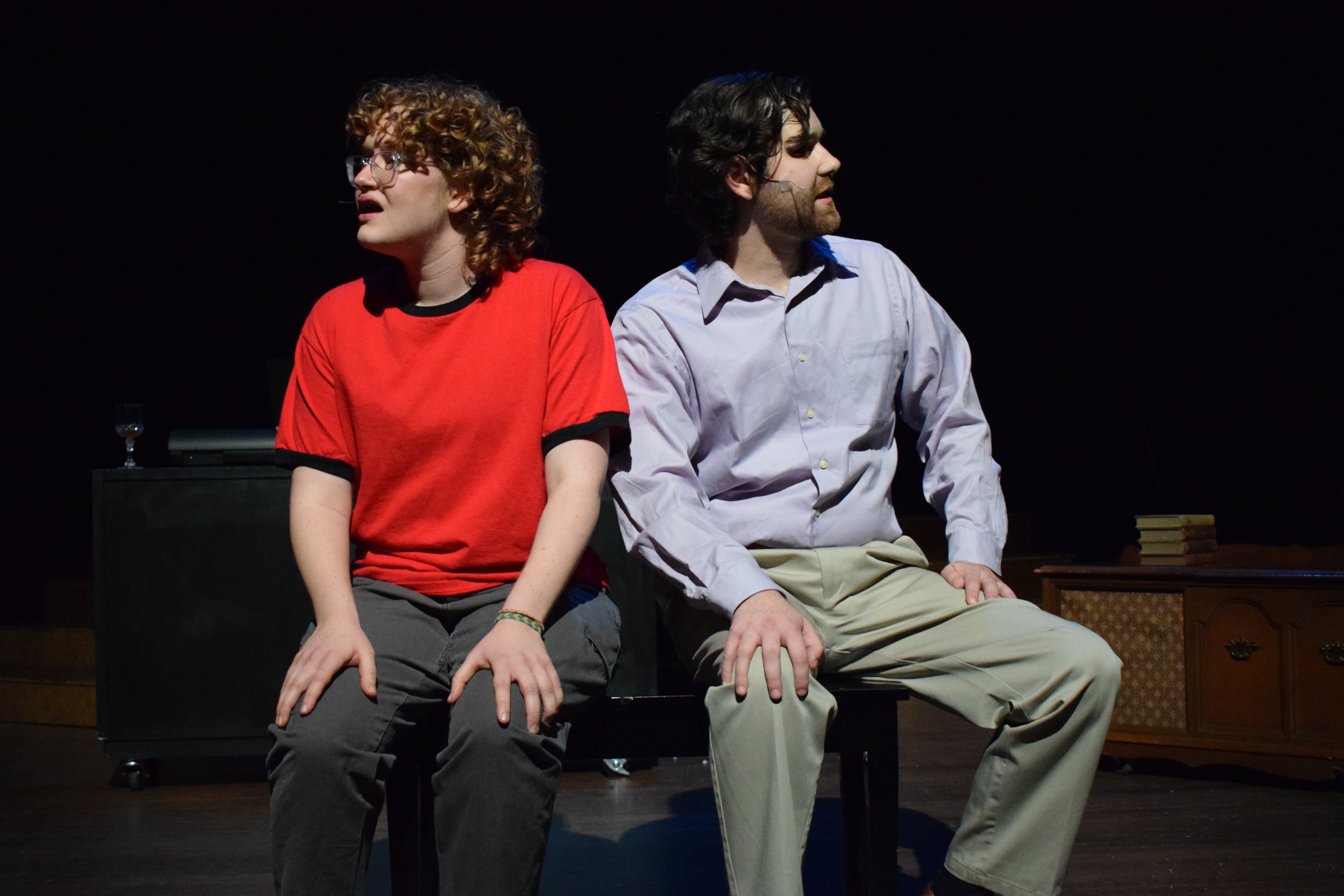Content warning: This article contains mention of mental health issues, grooming, and suicide.

For three nights, “Fun Home” revealed the autobiographical reflections of lesbian comic artist Alison Bechdel as she grapples with her childhood growing up in a funeral home run by her closeted, gay father, Bruce (Nate Wheeler ’25). The show, directed by Sof Cohen ’23, follows Alison across three periods of her life: as a child (“Small Al,” Susie Nakash ’26), as a college first-year (“Medium Al,” Hannah Sodickson ’26) and as an adult (“Big Al,” Lex Bryan ’23). The show was performed in the Patricelli ’92 Theater on Thursday, May 4 at 7:30 p.m., Friday, May 5 at 7:30 p.m., and Saturday, May 6 at 2 p.m. and 7:30 p.m.
“Fun Home” begins with present-day Big Al reviewing her childhood and college journals as she works on her memoir and explores a few key aspects of her father’s life, including his sexuality and his suicide. Bryan’s smooth vocals eased the audience into Big Al’s mind as she allows the memories of her youth to come flooding back. Throughout the rest of the show, Big Al guides the audience through assorted scenes from her life, providing essential commentary on how her perceptions of events have changed.
“Big Alison serves as a quasi-narrator herself and grapples with how to tell a compelling and difficult story without getting completely wrapped up in it,” Bryan wrote in an email to The Argus.
Small Al navigates the complexities of her family dynamic as her mother, Helen (Sage Saling ’26), struggles to get Alison and her siblings, John (Kiara Reeves ’26) and Christian (Charlotte George ’24), to abide by Bruce’s strict standards for maintaining and presenting their home, which doubles as the family funeral parlor—or the “Fun Home,” according to the kids.
Together, Nakash, Reeves, and George created a playful energy that communicated the sense of wonder with which kids approach even the most complicated aspects of life. Their youthful vitality contrasts starkly with Helen’s stern and worrisome nature, portrayed through careful empathy by Saling. Wheeler gave a layered performance that helped as the show explored how his character inflicted pain on the members of his family and others while wrestling with his own complex anguish.
Later on in her childhood, Small Al begins to take notice of her father’s regular absences from their home and the raucous fights that her parents often have. These fights are centered around his poorly-concealed sexuality and frequent efforts to groom young men and boys, including his high school English students. In a tense scene, Bruce and Helen struggle to explain to Small Al that Bruce has been mandated to see a psychiatrist as part of a court order after having been arrested for seducing a teenage boy (Quincy Segal ’26).
In her first year at Oberlin College, Medium Al discovers her sexuality, redefines her relationship with her parents after coming out, and meets her first love, Joan (Ryan Natcharian ’23). Sodickson’s calculated awkwardness played well off of Natcharian’s bold confidence to bring the audience a refreshing reminder of the excitement and uneasiness that characterize a first time, both in college and in love.
In one of the most emotional scenes in the play, Medium Al visits home with Joan in tow, and her mother finally reveals the sordid details of her father’s sexual past and admits that their relationship has been a failure.
Finally, as Medium Al goes for a drive with Bruce, Big Al soberly sings of the things she wishes she had asked and shared with him had she known he would die by suicide only a few weeks later. The show ends with all three Alisons singing in harmony, wondering what she might have done to prevent the tragedy, and how she can move forward.
In an email to The Argus, Cohen explained their motivation for bringing a musical centered around a lesbian protagonist to life.

“Musical theater is often seen as a very gay art form, but despite this reputation, there are relatively few shows that have queer main characters, even fewer that focus on lesbians, and shows centered around butch lesbians are practically nonexistent. (Forget musical theater, media seems to be allergic to butch and gender non-conforming lesbians),” Cohen wrote. “Butch characters are often watered down for a mainstream audience and made to be palatably feminine, or are portrayed as jokes or predators. Fun Home is an adaptation of Alison Bechdel’s autobiographical ‘tragicomic,’ and it is a butch telling her own story.”
The first three weeks of the rehearsal process focused on reading and understanding the sensitive and complex source material. For many of the actors, this emphasis on comprehension helped them to emotionally connect to their characters while grounding them in the world of the story.
“We did a lot of dramaturgical work in order to fully understand the play and the true nature of Alison Bechdel’s experiences,” Nakash wrote in an email to The Argus. “Everybody was very willing to be educated on the sensitive material of the play, and, during rehearsals, we approached the content mindfully and respectfully.”
Bryan added that even with the time spent working with intimacy coordinator Isabelle Chirls ’23, they had to figure out how to balance their emotional involvement with their character in their performance.
“Every step of the way, [Chirls] made sure that we were checking in with ourselves and each other, and understanding the separation between ourselves and our characters,” Bryan wrote. “The most I struggled was during the actual performances: I wanted to be emotionally in-tune with the show and wanted to portray authentic reactions to what was happening on stage, but I needed to be conscious and maintain a certain amount of distance from the content so I wouldn’t completely break into tears, although I did a couple [of] times. Still, I think that is the beauty of theater – letting yourself fall into the life of another person for a little while (to a healthy and controlled degree).”
Cohen worked alongside Chirls, who also served as assistant director, to center the cast and crew’s well-being during the audition and rehearsal processes as they explored the issues at hand.

“My priority has always been the safety and comfort of our cast and crew over the final product,” Cohen wrote. “[Chirls and I] made sure to check in on days when we would be covering the particularly heavy subjects, cultivated an environment in which actors fully knew that their safety came first and they were able to tap out at any time if they needed. One thing that was particularly important was ensuring that actors felt separate from their characters. Acting is a very emotional process, and the brain sometimes can’t tell the difference between what is real and what is fiction, so we worked to create a clear distinction between the work that happened in character and our own lives.”
Sodickson commented on the ways the rehearsal process and performances ultimately helped her to connect to herself, her character, and broader questions of queer identity.
“This show means so much to me because it portrays the story of a queer person’s relationship with their identity in such a real and relatable way,” Sodickson wrote in an email to The Argus. “This show perfectly captures some of the emotions and situations that many queer people experience throughout their lives, and I think it’s so important for queer people to see themselves portrayed on stage in such a real way. This show was one of the best experiences of my life, and I would like to shout out the incredibly talented cast and crew that made this all happen.”
Cohen hopes that each performance’s audience walked away with their own connections to the characters and story, and with a new perspective from seeing an underrepresented demographic on stage.
“I trust the audience to connect with the material as they will; it was more important for me that the show and the process happened, that everyone involved felt connected to both the material and the community we built, than portraying one specific message,” Cohen wrote. “I just want to see butch lesbians onstage.”
Sulan Bailey can be reached at sabailey@wesleyan.edu.


Leave a Reply